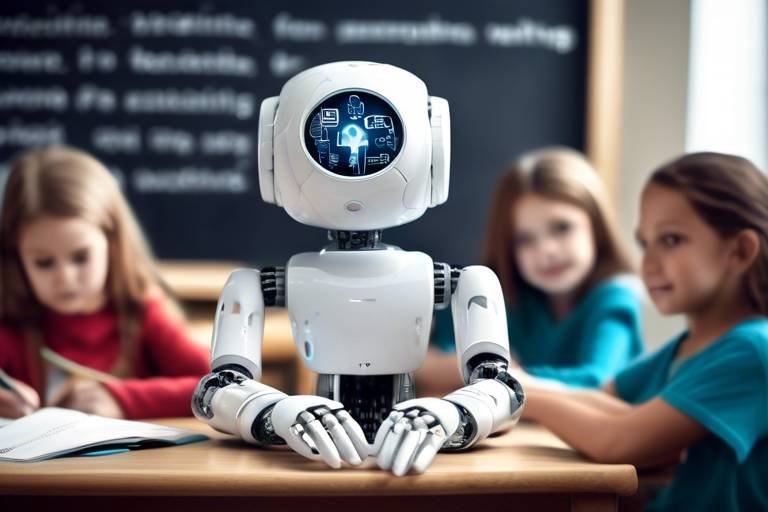Artificial Intelligence and Game Design: Player’s Delight
In today's fast-paced digital world, the intersection of artificial intelligence (AI) and game design has become a hot topic among developers and players alike. Imagine stepping into a game where every character feels alive, every challenge is tailored just for you, and the environment shifts in response to your actions. This isn’t science fiction; it’s the reality that AI brings to the gaming universe. As technology evolves, it empowers developers to craft experiences that are not only immersive but also incredibly engaging. Players are no longer mere spectators; they are active participants in a dynamic narrative that adapts to their choices. This article dives deep into how AI enhances player experiences, creates dynamic environments, and ultimately shapes the future of interactive entertainment.
Artificial intelligence plays a pivotal role in modern game development, enabling developers to create more immersive and responsive gaming experiences that adapt to player behavior and preferences. Think of AI as the brain behind the game. It processes vast amounts of data in real-time, allowing for a level of interactivity that was once thought impossible. Developers can now design games that learn from players, adjusting challenges and narratives based on individual play styles. This shift not only enhances gameplay but also fosters a deeper emotional connection between players and the game world. In essence, AI is transforming static experiences into vibrant, evolving adventures.
Non-player characters (NPCs) are vital for game immersion. Traditionally, NPCs followed pre-defined scripts, often resulting in predictable and uninspiring interactions. However, with AI-driven NPCs, these characters can exhibit realistic behaviors, making interactions more engaging and challenging for players. Imagine walking into a bustling market in a fantasy RPG, where every merchant and passerby reacts differently based on your actions or even your reputation in the game. This level of detail not only enhances gameplay but also creates a world that feels alive, where players are genuinely invested in their interactions.
AI technologies facilitate procedural content generation, allowing games to dynamically create levels, quests, and environments. This means that every player's experience is unique, ensuring that no two playthroughs are exactly alike. For instance, a game might generate a different dungeon layout or quest line depending on the player's previous choices. This not only increases replayability but also keeps players on their toes, always wondering what surprises await them in their next session.
One of the most frustrating aspects of gaming can be the difficulty spikes that leave players feeling overwhelmed or bored. Thankfully, AI can analyze player performance in real-time, adjusting game difficulty to match skill levels. This dynamic difficulty adjustment ensures a balanced challenge, keeping players engaged without becoming frustrated or bored. Imagine a racing game that senses when you’re struggling to keep up and subtly slows down the competition, allowing you to enjoy the thrill without feeling defeated.
Through machine learning algorithms, AI can tailor gaming experiences to individual players. This means adapting storylines, challenges, and environments based on player choices and behaviors. Picture a narrative-driven game where your decisions shape not only the plot but also the world around you. It’s like having a personal storyteller who knows your preferences and crafts an adventure that feels uniquely yours. This level of personalization can lead to deeper emotional engagement, making victories feel more rewarding and setbacks more impactful.
AI is revolutionizing game testing by automating quality assurance processes, identifying bugs, and optimizing gameplay mechanics. This results in a smoother launch and enhanced player satisfaction. Imagine a world where games are released with significantly fewer bugs, thanks to AI that meticulously sifts through code and gameplay scenarios. Players can dive into new releases with confidence, knowing they won’t encounter game-breaking glitches that ruin their experience.
As technology advances, the future of AI in gaming looks promising. With potential developments in virtual reality (VR), augmented reality (AR), and deeper player immersion, we are paving the way for groundbreaking gaming experiences. Consider VR games that adapt to your physical movements or AR games that blend seamlessly with the real world. The possibilities are endless, and as AI continues to evolve, so too will the ways we interact with our favorite games.
With the rise of AI in gaming, ethical questions arise regarding player data privacy, consent, and the potential for AI to manipulate player behavior. It’s crucial to have discussions on responsible AI use in game design. Players should feel secure knowing their data is protected and that their gaming experience is not being unduly influenced. Developers must navigate these waters carefully to maintain trust and integrity within the gaming community.
AI can significantly influence community interactions in multiplayer games. From managing player behavior to enhancing matchmaking systems, AI fosters a more enjoyable and engaging online environment. Imagine a game where AI monitors player interactions and promotes positive behavior while discouraging toxicity. This not only enhances the overall experience but also builds a stronger, more inclusive community.
- How does AI improve NPC behavior? AI allows NPCs to react realistically to player actions, creating more engaging interactions.
- What is procedural content generation? It's a method where AI creates unique game elements, ensuring no two players have the same experience.
- Can AI adjust game difficulty? Yes, AI can analyze player performance and modify difficulty in real-time to keep gameplay balanced.
- What ethical concerns are there with AI in gaming? Issues include player data privacy, consent, and the potential for manipulation of player behavior.

The Role of AI in Game Development
Artificial intelligence (AI) has become a cornerstone in the world of game development, transforming how developers create and players experience games. Imagine stepping into a virtual world where the environment and characters respond to your every move, crafting a unique narrative tailored just for you. This is not just a fantasy anymore; it's the reality that AI brings to the gaming table. By leveraging complex algorithms and machine learning techniques, developers can build games that adapt to player behaviors, preferences, and even emotional states, resulting in a truly immersive gaming experience.
One of the most significant advantages AI offers is its capability to analyze vast amounts of data in real-time. This means that as you play, the game can learn from your actions, adjusting challenges and narratives to keep you engaged. For instance, if you're breezing through levels, the game can ramp up the difficulty to ensure you're continually challenged. Conversely, if you're struggling, it can ease up, preventing frustration. This dynamic approach to difficulty not only enhances player satisfaction but also keeps the gameplay fresh and exciting.
Furthermore, AI plays a crucial role in developing non-player characters (NPCs). Gone are the days of predictable, robotic NPCs that merely serve as background elements. Today’s AI-driven NPCs can exhibit a range of realistic behaviors, making them feel more alive and interactive. They can engage in conversations, react to player actions, and even evolve over time, creating a rich tapestry of interactions that enhance the overall gameplay experience. Players are no longer just completing missions; they are building relationships and navigating complex social dynamics within the game.
Another fascinating aspect of AI in game development is procedural content generation. This technology allows developers to create vast, intricate worlds that are not only visually stunning but also unique for every player. Imagine exploring a game where each playthrough offers different landscapes, quests, and challenges. This not only boosts replayability but also keeps the excitement alive, as players never know what to expect on their next adventure. For example, a game could use AI to generate a new dungeon layout every time you enter, ensuring that each exploration feels fresh and unpredictable.
In addition to enhancing gameplay, AI is also streamlining the development process itself. By automating certain aspects of game testing, AI can help identify bugs and optimize gameplay mechanics more efficiently than human testers alone. This leads to a smoother launch and a more polished final product, ultimately enhancing player satisfaction. Developers can focus more on creativity and innovation while leaving the tedious tasks to AI, which can analyze countless scenarios and pinpoint issues that might take human testers much longer to find.
As we look to the future, it’s clear that AI will continue to play a pivotal role in shaping game development. With advancements in technology, we can expect even more sophisticated AI systems that will push the boundaries of what games can achieve. From creating hyper-realistic virtual worlds to crafting narratives that respond to player emotions, the possibilities are endless. The intersection of AI and game design is not just a trend; it’s the future of interactive entertainment, promising to deliver experiences that are not only entertaining but also profoundly engaging and personalized.

Enhancing NPC Behavior with AI
Non-player characters (NPCs) have long been the backbone of immersive gaming experiences. They are the friendly villagers, the menacing foes, and even the quirky sidekicks that make a game world feel alive. However, traditional NPCs often follow predictable patterns, which can lead to a lackluster player experience. Enter artificial intelligence! By leveraging AI, developers are transforming NPC behavior into something truly remarkable, creating characters that respond dynamically to player actions and contribute to a richer narrative.
Imagine walking through a bustling medieval town in your favorite RPG. Instead of NPCs merely repeating the same lines or standing still, you encounter characters that react to your presence. An AI-driven NPC might notice your armor and comment on it, or if you're carrying a weapon, they may show fear or even challenge you to a duel. This kind of adaptive behavior not only enhances realism but also deepens player engagement, making each interaction feel unique.
Moreover, AI allows NPCs to exhibit a range of emotional responses. For instance, if you help a villager in distress, they might express gratitude, while a character you’ve wronged could show hostility or fear. This emotional depth can lead to a more immersive storytelling experience, where players feel the weight of their choices. It’s as if the game world is alive, with NPCs that have their own motivations and feelings, rather than just being static elements of the scenery.
One of the most exciting applications of AI in enhancing NPC behavior is through procedural content generation. This technology allows games to create unique scenarios and interactions on the fly. For example, in an open-world game, the NPCs can generate quests based on the player's previous actions or current status within the game. This means that no two players will have the same experience, as NPCs can offer different missions, dialogue, and interactions based on a multitude of factors.
This procedural approach not only increases replayability but also keeps players on their toes. You never know what kind of quest an NPC might offer you or how they might react to your decisions. This unpredictability adds a layer of excitement and encourages players to explore every corner of the game world.
With AI, NPCs can also engage in dynamic interactions that evolve over time. For instance, if a player consistently helps a specific NPC, that character might start to trust the player more, opening up new dialogue options and quests. Conversely, if the player behaves aggressively or makes poor choices, NPCs might become wary or hostile, changing the way they interact with the player. This creates a living, breathing world where relationships matter and player actions have consequences.
AI-enhanced NPCs also provide realistic challenges for players. Instead of following a fixed path or strategy, AI can allow NPCs to learn from the player's actions. If a player frequently uses a specific tactic to defeat enemies, the NPCs can adapt their strategies to counteract that approach. This creates a more challenging and engaging gameplay experience, as players must continually evolve their strategies to succeed.
In summary, the integration of AI into NPC behavior is revolutionizing how players interact with game worlds. By creating characters that are responsive, emotional, and capable of evolving based on player actions, developers are crafting immersive experiences that feel personal and engaging. The future of gaming is not just about graphics or storylines; it’s about creating a world where every character feels alive and every interaction matters.
- What is the role of AI in enhancing NPC behavior?
AI enables NPCs to react dynamically to player actions, creating more realistic and engaging interactions. - How does procedural content generation work?
This technology allows games to create unique quests and scenarios based on player behavior, ensuring a fresh experience for everyone. - Can NPCs learn from player actions?
Yes, AI can allow NPCs to adapt their strategies and interactions based on how players behave, making challenges more realistic.

Procedural Content Generation
Procedural Content Generation (PCG) is like giving a magic wand to game developers, allowing them to create vast, intricate worlds without the need for painstaking manual labor. Imagine stepping into a game where every playthrough feels fresh and unique—this is the power of AI-driven PCG. With algorithms that can generate levels, quests, and even entire ecosystems on the fly, players are treated to an experience that feels tailored just for them. It's akin to having a new adventure waiting every time you log in, where no two journeys are ever the same.
At its core, PCG utilizes mathematical models and AI techniques to produce game content dynamically. This means that instead of relying on pre-designed maps and scenarios, developers can create systems that generate content based on specific parameters. For instance, a game might have a set of rules for terrain generation, character appearances, or item placements, and the AI fills in the details. The result? A world that feels alive and constantly evolving, much like our own.
One of the most exciting aspects of PCG is its ability to enhance replayability. Players often return to games not just for the story or mechanics but for the thrill of exploring something new. With procedural generation, each playthrough can present different challenges and surprises. Here are a few examples of how PCG enhances player experiences:
- Endless Exploration: Players can traverse vast landscapes that are never the same twice, discovering new secrets and challenges with each visit.
- Varied Quests: Instead of repeating the same missions, players can encounter a variety of quests that adapt to their playstyle and choices.
- Unique Encounters: AI can generate different enemies or allies based on the player's previous interactions, making each encounter feel significant.
Moreover, the integration of PCG can lead to unexpected outcomes that can surprise even the developers. Imagine a player stumbling upon a hidden cave filled with treasures, only to find that the layout and challenges change every time they enter. This unpredictability not only keeps players engaged but also fuels their desire to explore every nook and cranny of the game world.
However, while the benefits of PCG are immense, there are challenges to consider. Developers must strike a balance between randomness and coherence, ensuring that generated content feels like a natural part of the game world rather than a jarring addition. Additionally, maintaining quality control over procedurally generated content is crucial. After all, no player wants to encounter a glitchy mess that disrupts their gaming experience. Therefore, AI can also play a role in refining and optimizing the generated content, ensuring that it meets the high standards players expect.
In conclusion, Procedural Content Generation is revolutionizing the gaming landscape, offering players a chance to experience unique adventures every time they dive into a game. With AI at the helm, the possibilities are endless, and the future of gaming looks more exciting than ever. Just imagine the thrill of stepping into a game where every corner holds a new surprise, and every quest unfolds in a way you never anticipated. That's the magic of AI-driven procedural content generation!

Dynamic Difficulty Adjustment
Dynamic Difficulty Adjustment (DDA) is like having a personal trainer in the gaming world—always there to push you just enough to keep you engaged without overwhelming you. Imagine you're playing a thrilling action game, and you’re breezing through the levels. Suddenly, the game detects your impressive skills and ramps up the difficulty, throwing in tougher enemies or more complex puzzles. This intelligent adjustment ensures that you’re constantly challenged, but never to the point of frustration. It’s all about finding that sweet spot where the game is both fun and engaging.
But how does this magical adjustment actually work? At its core, DDA utilizes advanced AI algorithms to analyze your gameplay in real-time. The system monitors various metrics, such as your success rate, time taken to complete tasks, and even how often you die in-game. Based on this data, the game can make instantaneous adjustments. For instance, if you’re struggling with a boss fight, the AI might reduce the boss's health or alter its attack patterns to give you a fighting chance. Conversely, if you’re dominating the game, it might increase the challenge by introducing new mechanics or tougher opponents.
The beauty of DDA lies in its ability to create a personalized experience for each player. No two players are alike, and their skill levels can vary widely. By tailoring the difficulty to match individual abilities, games can enhance player satisfaction and encourage longer play sessions. Players are more likely to stick around when they feel the game is just right for them. It’s like adjusting the temperature in a room—too hot, and it’s unbearable; too cold, and you’ll want to leave. DDA keeps the gaming experience at a comfortable temperature, so to speak.
Moreover, DDA can also contribute to replayability. When players know that the game will adjust to their skill level, they may be more inclined to replay it, exploring different strategies or play styles. This adaptability not only increases engagement but also fosters a deeper connection with the game. Players become invested in their journey, knowing that the game will evolve alongside their skills.
Of course, implementing DDA isn’t without its challenges. Developers must strike a balance between making adjustments that are noticeable but not jarring. If a player feels like the game is unfairly manipulating difficulty, it can lead to frustration rather than enjoyment. Therefore, transparency is key. Some games provide players with feedback on how difficulty is being adjusted, which can help maintain trust and satisfaction.
In conclusion, Dynamic Difficulty Adjustment is a game-changer in the world of interactive entertainment. By leveraging AI to create a more personalized and engaging experience, developers can keep players on their toes while ensuring they have fun. As technology continues to advance, we can expect DDA to become even more sophisticated, pushing the boundaries of what’s possible in gaming. So, next time you find yourself facing a nail-biting challenge in a game, remember that there’s a smart AI working behind the scenes to keep your experience just right!
- What is Dynamic Difficulty Adjustment?
Dynamic Difficulty Adjustment is a feature in video games that alters the game's difficulty in real-time based on the player's performance to maintain an engaging experience.
- How does DDA work?
DDA uses AI algorithms to analyze player metrics such as success rates and time taken to adapt the game's difficulty level accordingly.
- Can DDA be turned off?
Many games allow players to disable DDA if they prefer a static difficulty level, giving them full control over their gaming experience.
- Does DDA affect replayability?
Yes! By adjusting difficulty based on player skill, DDA can enhance replayability, encouraging players to explore different strategies.

Personalized Gaming Experiences
In the ever-evolving world of gaming, personalization has emerged as a game-changer, and artificial intelligence (AI) is at the forefront of this revolution. Imagine diving into a game where every decision you make shapes your adventure, tailoring the experience specifically to you. This is not just a dream; it's the reality that AI is crafting for players. By leveraging machine learning algorithms and data analytics, game developers can create experiences that adapt and respond to individual players in real-time.
So, how exactly does this work? Well, AI analyzes player behavior, choices, and even emotional responses to adjust various elements of the game. For instance, if you tend to favor stealthy approaches over brute force, the game can dynamically modify challenges and quests to align with your playstyle. This results in a more immersive experience where you feel like the game is truly listening to you.
Moreover, personalized gaming experiences can manifest in several exciting ways:
- Adaptive Storylines: The narrative can shift based on your choices, leading to multiple endings and richer story arcs.
- Customizable Characters: AI can suggest character traits and skills that complement your playing style, making you feel more connected to your avatar.
- Dynamic Environments: The game world can change based on your actions, creating a living, breathing environment that reacts to you.
This level of personalization not only enhances player engagement but also significantly boosts replayability. Players are more likely to return to a game that offers a fresh experience each time they play. In fact, studies have shown that games with personalized elements can increase player retention rates by up to 30%. Now, that’s a statistic that speaks volumes about the importance of AI in crafting unique gaming experiences!
However, with great power comes great responsibility. As developers harness the capabilities of AI to create personalized experiences, they must also navigate the fine line of ensuring player privacy and consent. It’s crucial that players are aware of how their data is being used to enhance their gaming journey. Transparency in AI-driven personalization will not only build trust but also foster a more enjoyable gaming environment.
In conclusion, the integration of AI in creating personalized gaming experiences is not just a trend; it's the future of interactive entertainment. As technology continues to advance, we can only expect these experiences to become even more refined, making each gaming session feel like a unique adventure crafted just for you.
- How does AI personalize gaming experiences?
AI analyzes player behavior and choices to tailor the gameplay, including storylines and challenges. - Can personalized gaming experiences enhance replayability?
Yes, personalized elements can make each playthrough unique and engaging, encouraging players to return. - What are the ethical considerations in AI personalization?
Developers must ensure transparency regarding player data usage and obtain consent to maintain trust.

AI in Game Testing
The integration of artificial intelligence into game testing is nothing short of revolutionary. Imagine a world where bugs are identified and fixed faster than a player can say "game over." With AI, this is becoming a reality. AI technologies are streamlining the quality assurance process, allowing developers to focus on creating engaging content rather than getting bogged down by tedious testing. The traditional methods of game testing, which often involve countless hours of manual testing, are being enhanced by AI's ability to automate many of these processes.
One of the most significant advantages of AI in game testing is its ability to analyze vast amounts of data quickly and efficiently. AI algorithms can sift through gameplay data, pinpointing areas where players experience issues or bugs. This not only expedites the testing phase but also improves the overall quality of the game. For instance, AI can simulate thousands of player interactions in a fraction of the time it would take a human tester, ensuring that the game can handle various scenarios before it hits the market.
Furthermore, AI can assist in optimizing gameplay mechanics. By assessing player behavior, AI can suggest adjustments that enhance the gaming experience. This means that developers can receive real-time feedback on what works and what doesn’t, allowing for more informed decisions during the development process. Imagine having a virtual assistant that not only identifies problems but also offers solutions based on player interactions. That’s the power of AI in game testing.
Additionally, AI can help in creating more realistic testing environments. By using machine learning, AI can generate scenarios that mimic real player behavior, helping developers understand how their games will perform in the wild. This approach leads to more thorough testing and ultimately results in a smoother launch. As games become increasingly complex, the need for such sophisticated testing methods becomes ever more critical.
In summary, the role of AI in game testing is transforming how games are developed and released. By automating routine tasks, analyzing player data, and optimizing gameplay, AI not only enhances the quality of games but also allows developers to allocate their resources more effectively. The future of game testing looks bright, and as AI technology continues to evolve, we can expect even more exciting advancements in the gaming industry.
- How does AI improve game testing?
AI improves game testing by automating routine tasks, analyzing player data quickly, and simulating player interactions to identify bugs and optimize gameplay.
- Can AI completely replace human testers?
While AI can automate many aspects of testing, human testers are still essential for providing insights into player experience and creativity in problem-solving.
- What types of games benefit most from AI in testing?
Complex games with rich environments and multiple player interactions, such as MMORPGs and open-world games, benefit significantly from AI testing methodologies.
- Is AI testing cost-effective?
Yes, AI testing can be cost-effective in the long run by reducing the time and resources needed for manual testing, leading to quicker releases and fewer post-launch issues.

The Future of AI in Gaming
As we look ahead, the future of artificial intelligence in gaming is not just exciting; it’s downright revolutionary! Imagine a world where games adapt to your every move, creating an experience that is uniquely yours. With advancements in technology, AI is set to enhance not just the gameplay but the entire gaming ecosystem. From virtual reality (VR) to augmented reality (AR), the integration of AI promises to blur the lines between the digital and physical worlds, making gaming more immersive than ever.
One of the most thrilling prospects is the development of intelligent NPCs that can learn from player behaviors and adapt accordingly. This means that every encounter with an NPC could be different, tailored to your style of play. Imagine an NPC that remembers your past interactions and changes its dialogue or actions based on your decisions. This level of depth not only enriches the narrative but also creates a more engaging environment where players feel their choices truly matter.
Moreover, the rise of machine learning will enable games to analyze vast amounts of player data, predicting trends and preferences. Developers will be able to use this data to create personalized experiences that resonate with individual players. For instance, if you tend to favor stealthy approaches, the game could offer more stealth-based challenges, enhancing your enjoyment and keeping you engaged.
Additionally, AI could play a crucial role in creating expansive game worlds. Imagine a game where entire landscapes are generated on-the-fly, based on the player's journey. With procedural generation powered by AI, every playthrough could feel fresh and unpredictable. This not only boosts replayability but also allows developers to create richer, more diverse environments without the need for extensive manual design.
However, with great power comes great responsibility. As AI continues to evolve, ethical considerations will become increasingly important. Issues surrounding player data privacy and consent will need to be addressed. Developers must ensure that AI is used responsibly, promoting a healthy gaming environment that respects player autonomy and privacy.
In summary, the future of AI in gaming is a thrilling horizon filled with potential. As we embrace these advancements, we can expect a gaming landscape that is not only more interactive but also deeply personalized. The journey toward this future will undoubtedly be filled with surprises and innovations that will redefine how we experience games.
- What is the role of AI in enhancing player experiences?
AI enhances player experiences by creating dynamic environments, adapting gameplay to individual styles, and personalizing storylines, making each gaming session unique.
- How will AI impact NPC behavior in future games?
Future games will feature AI-driven NPCs that can learn from player interactions, creating more realistic and engaging gameplay.
- What are the ethical concerns related to AI in gaming?
Ethical concerns include player data privacy, consent, and the potential for AI to manipulate player behavior, which necessitates responsible AI use in game design.

Ethical Considerations in AI Gaming
As artificial intelligence continues to weave its way into the fabric of gaming, it brings with it a host of ethical considerations that cannot be ignored. One of the most pressing issues is player data privacy. With AI systems collecting vast amounts of data to tailor experiences, players often wonder, "How much of my personal information is being used, and is it safe?" This concern is not unfounded; players deserve transparency about what data is collected and how it is utilized.
Moreover, the question of consent arises. Are players fully aware of the extent to which AI influences their gaming experience? Many games use algorithms to analyze player behavior, adjusting challenges and narratives accordingly. This raises the ethical dilemma of whether players are consenting to be nudged or directed by AI in ways they might not fully understand. It's akin to a magician performing tricks; if you know how the trick is done, the magic fades away. Similarly, if players are aware of AI's role in shaping their experiences, the immersion may diminish.
Another significant concern is the potential for AI to manipulate player behavior. Imagine a game that subtly encourages players to spend more money on in-game purchases by adjusting the difficulty of challenges. This is a slippery slope that can lead to exploitative practices, especially in games targeted at younger audiences. Developers must tread carefully, ensuring that AI enhances the gaming experience without crossing ethical lines.
To address these issues, the gaming industry must establish clear guidelines and ethical frameworks that prioritize player welfare. This could involve:
- Transparent Data Policies: Games should clearly communicate what data is collected, how it’s used, and provide options for players to opt-out.
- Informed Consent: Players should be made aware of AI's role in their gaming experience, ensuring they understand how their actions might be influenced.
- Responsible AI Use: Developers should commit to using AI in ways that enhance enjoyment without exploiting players.
As the gaming landscape evolves, it’s crucial for developers and players alike to engage in ongoing discussions about these ethical considerations. By fostering an environment of transparency and respect, the gaming community can embrace the incredible potential of AI while safeguarding the interests and rights of players.
| Question | Answer |
|---|---|
| How is player data used in AI gaming? | Player data is often used to personalize gaming experiences, adjust difficulty levels, and enhance overall engagement. |
| What are the ethical concerns regarding AI in gaming? | Concerns include data privacy, informed consent, and the potential for manipulation of player behavior. |
| How can players protect their data in AI-driven games? | Players should review privacy policies, opt-out of data collection when possible, and stay informed about how their data is used. |

Community and Multiplayer Dynamics
In the vast landscape of gaming, serve as the backbone of player interaction and engagement. Imagine stepping into a virtual world where not only your skills are tested but also your relationships with other players. This is where artificial intelligence (AI) steps in, acting as a powerful ally in enhancing these dynamics. By leveraging AI, game developers can create environments that foster meaningful connections among players, making every gaming session feel like a shared adventure.
One of the most exciting aspects of AI in multiplayer games is its ability to manage player behavior. Through sophisticated algorithms, AI can monitor interactions and identify toxic behavior, ensuring a more positive atmosphere. For instance, if a player consistently engages in harassment or disruptive actions, AI can intervene by issuing warnings or even temporary bans. This not only protects the community but also promotes a culture of respect and camaraderie. After all, who wants to play in a toxic environment?
Moreover, AI enhances matchmaking systems, which are crucial for creating balanced and enjoyable multiplayer experiences. Imagine waiting in a lobby, only to be matched with players who are way out of your league. Frustrating, right? AI can analyze player statistics, skill levels, and even play styles to ensure that matches are as fair and competitive as possible. This means you can face opponents who challenge you just enough to keep the thrill alive without feeling overwhelmed.
AI also plays a significant role in fostering community engagement through personalized experiences. For example, AI can track your preferences and suggest events or challenges that align with your interests. It’s like having a personal gaming assistant that knows exactly what you enjoy! This level of personalization not only keeps players invested but also encourages them to participate in community events, forming bonds over shared experiences.
Furthermore, AI can facilitate in-game events that bring the community together. Imagine a massive multiplayer game hosting a seasonal festival where players can team up for special quests or challenges. AI can dynamically adjust these events based on player participation and engagement levels, ensuring that everyone feels included and excited. This not only enhances the gaming experience but also strengthens the community ties, making players feel like they are part of something bigger.
To sum it up, the integration of AI in community and multiplayer dynamics is a game changer. It not only enhances player interactions but also creates a more enjoyable and engaging environment. As we look to the future, we can expect AI to continue evolving, paving the way for even more innovative ways to connect players and enrich their gaming experiences.
- How does AI improve matchmaking in multiplayer games?
AI analyzes player data to create fair and balanced matches, ensuring players face opponents of similar skill levels. - Can AI detect toxic behavior in games?
Yes, AI can monitor player interactions and identify toxic behavior, helping to maintain a positive gaming environment. - What role does AI play in community engagement?
AI personalizes player experiences, suggesting events and challenges based on individual preferences to foster community involvement. - Will AI change the way in-game events are managed?
Absolutely! AI can dynamically adjust in-game events based on player participation, ensuring they remain engaging and enjoyable.
Frequently Asked Questions
-
How does AI enhance player experiences in games?
AI enhances player experiences by creating more immersive and adaptive environments. It allows games to respond to player actions and preferences, ensuring that each gaming session feels unique and engaging. Imagine playing a game where the world changes based on your decisions—AI makes that possible!
-
What is the role of AI in non-player character (NPC) behavior?
AI plays a crucial role in making NPCs behave more realistically. Instead of following simple scripts, AI-driven NPCs can learn from player interactions, making them more engaging and challenging. This means players can enjoy richer storylines and more dynamic gameplay.
-
What is procedural content generation in gaming?
Procedural content generation is a method where AI creates game content dynamically, such as levels, quests, and environments. This ensures that players have a unique experience every time they play, increasing replayability and keeping the game fresh and exciting.
-
How does AI adjust game difficulty?
AI can analyze a player's performance in real-time and adjust the game's difficulty accordingly. This means if you're breezing through a level, the game can ramp up the challenge, while if you're struggling, it can ease off a bit, keeping the experience balanced and enjoyable.
-
Can AI personalize gaming experiences?
Absolutely! Through machine learning, AI can tailor game experiences to individual players by adapting storylines, challenges, and environments based on their choices and play styles. This personalization makes each player's adventure feel unique and special.
-
How is AI used in game testing?
AI revolutionizes game testing by automating quality assurance processes. It can identify bugs and optimize gameplay mechanics much faster than human testers, leading to a smoother launch and improved player satisfaction.
-
What does the future hold for AI in gaming?
The future of AI in gaming is bright! As technology advances, we can expect developments in virtual and augmented reality, offering deeper player immersion and groundbreaking gaming experiences that we can only dream of today.
-
What ethical considerations should be taken into account with AI in gaming?
As AI becomes more prevalent in gaming, ethical questions arise regarding player data privacy, consent, and the potential for AI to manipulate player behavior. It's essential for developers to engage in responsible AI use and ensure players' rights and experiences are respected.
-
How does AI impact community dynamics in multiplayer games?
AI significantly influences community interactions by managing player behavior and enhancing matchmaking systems. This fosters a more enjoyable and engaging online environment, ensuring players have a better experience while gaming with others.



















